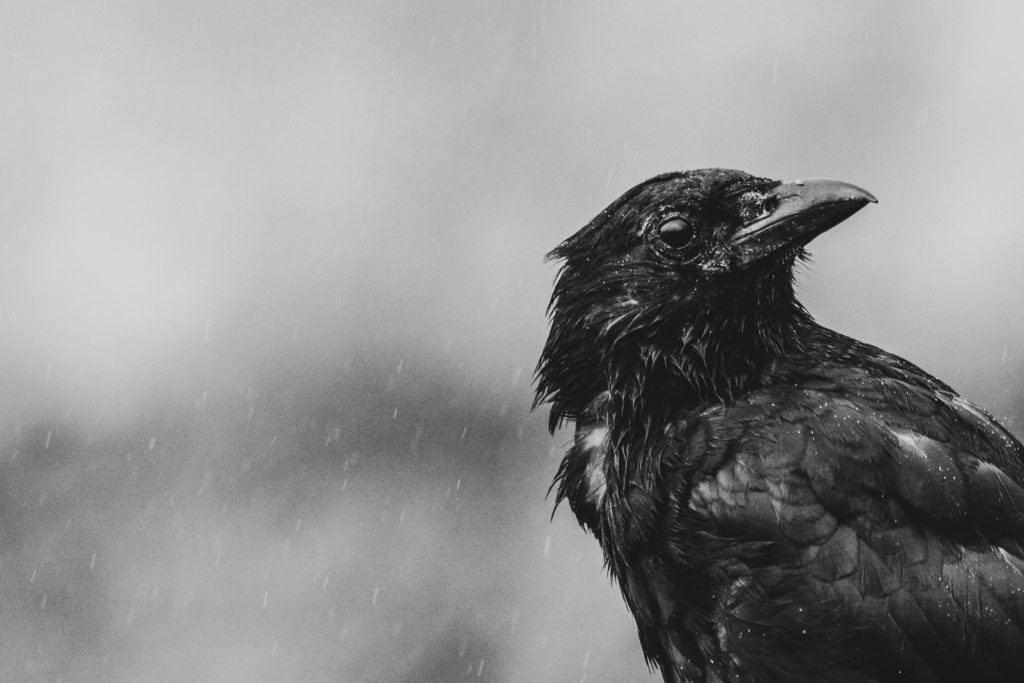The following is a prose-poem based on outside experience for women suffering after an abortion, in prayerful hope for their healing and consolation.
It is an old grief — a dirty, draggled bird that perches in a corner of my mind.
It keeps quiet, mostly, though his silence is heavy, a brooding silence that I can almost touch. Once in a while, less often, thankfully, than before, he caws the guilt that only I can hear. I halt, whatever I am doing, and listen. I’m glad when the sound fades.
I’m not complaining. There were years when the nasty beast sat on my shoulder, peering balefully at the doings of my life. I would feed him bits of myself, the bits that seemed to belong to him by rights. It was wrong of me to do this.
I know it now although I certainly knew it then. Hadn’t I read the word mercy, written on countless pages and in many languages? Hadn’t I known, since childhood, of the forgiving flood that poured over the world? First on the torture-rock of Golgotha above the city, and ever since, ceaselessly repeating on sacrificial altars everywhere?
I went seeking mercy, yes, and sounded out the litanies, soothed by their insistent rhythms. I assented eagerly and hopefully — I believe! Help my unbelief! In curtained tiny alcoves I knelt, waiting for the bath of grace. It flowed through the pierced veil from dimly seen lips, warm with the breath of man.
Eo te absolvo…
But my dingy, feathered tormentor waited just outside the sanctuary, cawing, knowing my hope would wilt in the hot sun.
What did he cry in his cracked, evil voice but the simple truth?
The young girl gifted with a staunch faith had grown up to disappoint. Her wings failed her in her first awkward sally into a degraded world. She who should have flown sank instead.
Nothing very strange here, you say. This is the self-same story of every human soul. Only one daughter of Eve walked with clean pure feet on the earth, only one woman had nothing to shake off her soles when she took wing.
But that seedy crow in the corner speaks of the darkest things. There’s something blacker in its wings than the ink of space, gloomier than the moldy coat of a Dickensian undertaker. The prophet reviled King David, but what is it, to my sin, the theft of a poor man’s only sheep?
David sinned for beauty, at least, and the life he took was only that of a comrade-in-arms. Not that of his own hidden child.
My prophet-bird croaks, accusing, of pointless shallow sins born of ennui. There was no overpowering burst, no pulsing love that ravished me into wickedness. I sold a high birthright for a mess of porridge — sticky and insipid, at that.
I’m not alone, I know. Beside me march legions of women, and men. I hear their own dark crows sometimes, cawing in the space behind their eyes, in cocktail parties, or earnestly and sadly on the internet.
The world goes on its brutal way, saying that what we hear is nothing but the clanging chains of scrupulosity, the iron drag of dusty traditions.
The world is wrong. We of the black birds know it.
For years now I’ve failed to chase my tormentor away from the shadowy places in which he lurks. But lately I’ve had grace-born glimmers of an entirely different hope. I’m starting to think that I am meant to keep him close, and that the Splendid One has a plan for both of us.
I am beginning to believe, really believe, that He means to turn my dark prophet into a glorious thing — a shining singer of songs of joy.
Not the messenger of doom but the herald of my transformed self; sorrowing, yes, but willing to think myself worthy of the promises of Christ, willing to be bathed by Him, made clean and new.
Lord, help me let you. Let me let you.

